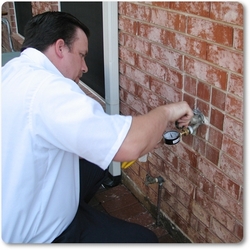Aug 21 2010
Slab leaks and triple-digit temperatures go hand-in-hand in North Texas, but the Heat Wave of 2010 is causing more trouble than usual for homeowners.
The combination of three consecutive weeks of triple-digit temperatures and very little rain is causing clay soil beneath homes to dry out. As it does, it cracks and shifts, breaking foundations along with gas and water lines beneath them.
Master plumber Bill Stevens, president of Berkey’s Plumbing, Heating and Air Conditioning, Inc., says the long, dry spell in July and August this year is taking a heavy toll on plumbing systems. He said calls to his company to find suspected slab leaks have increased, but homeowners can prevent most, if not all, serious damage by taking some precautions themselves.
Stevens says people fear a catastrophic plumbing line failure beneath their homes, the kind that sends a rush of water that covers the entire fist floor in a matter of minutes. But for every big failure like that there are countless other small leaks caused by soil shifting beneath a home. Those small leaks make for big, costly problems.
 A Berkey's plumber performs a pressure test of a home's plumbing lines as part of an annual plumbing tune up.
A Berkey's plumber performs a pressure test of a home's plumbing lines as part of an annual plumbing tune up.
“It doesn’t take much movement of our clay soil to crack a pipe or loosen a fitting on a buried water or gas line because of the tremendous pressure involved,” Stevens said. “This often causes slow slab leaks that are hard for homeowners to detect. In most cases, people don’t even know they have a leak.”
The best prevention, Stevens said, is to keep foundations watered year-around, but especially during the current drought conditions. He recommends placing a soaker hose a foot or two from the foundation and watering slowly every other day to keep the soil moist, not soggy. If there are foundation plantings or large trees nearby, water more, because a big tree can pull as much as 150 gallons of water from the ground every day.
Licensed plumbers are trained to detect leaks anywhere in a home, but often homeowners don’t call for help until it is too late. Stevens says homeowners should constantly watch for signs of a leak, especially one beneath the home. Signs of a possible leak include:
- Vegetation growing unevenly around a home
- Dark spots on hardwood flooring or carpet
- Higher water bills for no apparent reason
- Sound of water running when no taps are open
- Water meter changes when no taps are open
- Visible foundation cracks
Undetected small leaks can result in big leaks, with repairs costing tens of thousands of dollars. For example, a small leak in clay soil can cause additional shifting, which can lead to a water line breaking completely. When that happens a slab leak is like an open fire hydrant, erupting into the home, flooding the entire ground floor. Stevens says homeowners should check their homeowner insurance policies to see if they cover such damage – many do not.
One simple preventive step homeowners can take is to have an annual plumbing “tune up” to check for problems. Stevens says better plumbing companies offer this service, which includes a pressure test to look for leaks. “Homeowners can save a lot of money and grief by finding small problems before they become big headaches,” he said.
Source: http://www.berkeys.com/